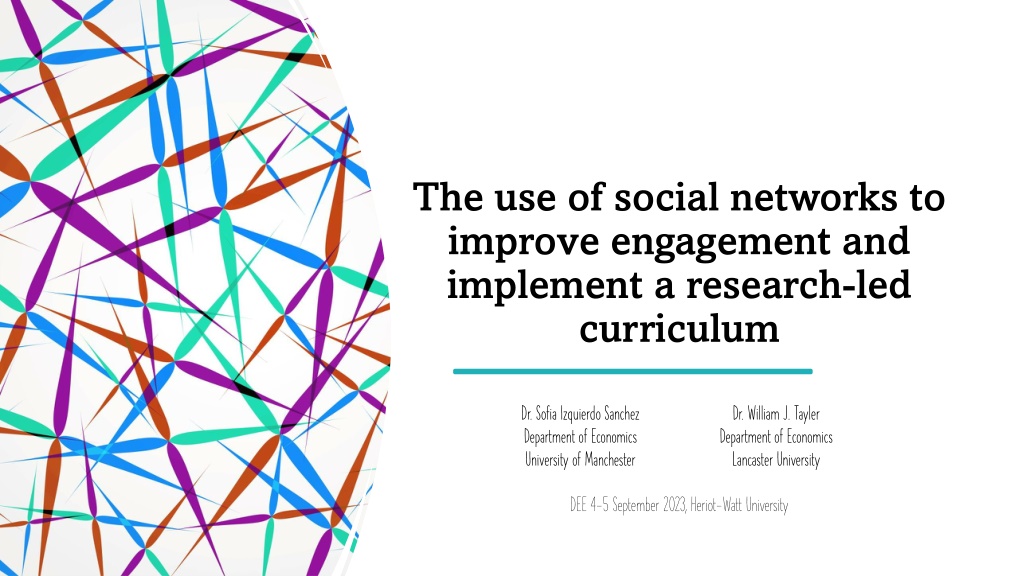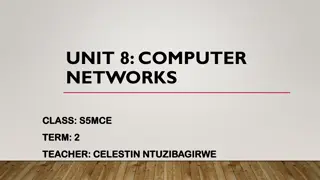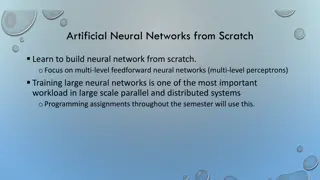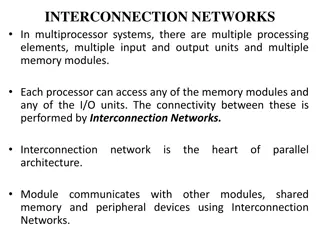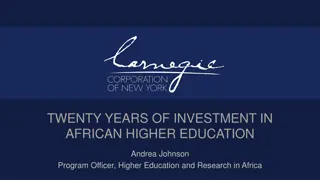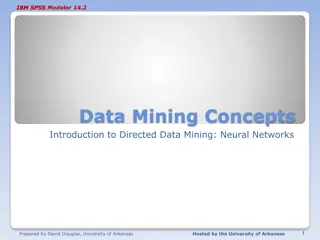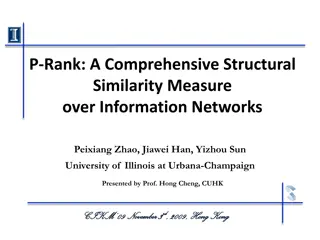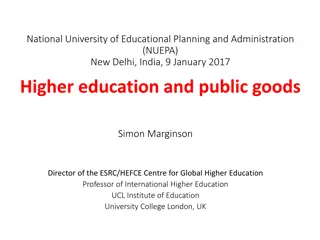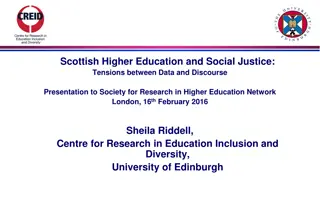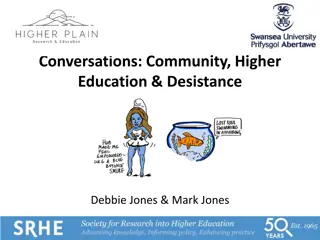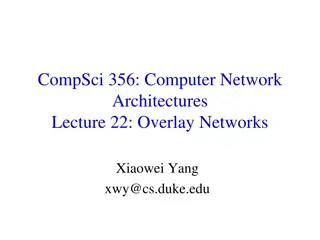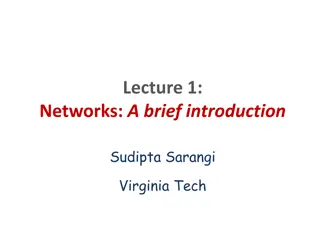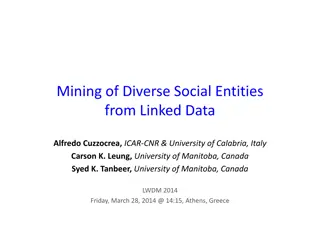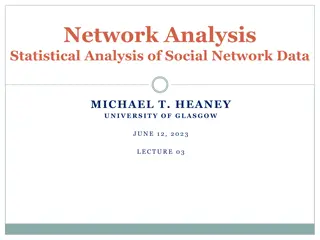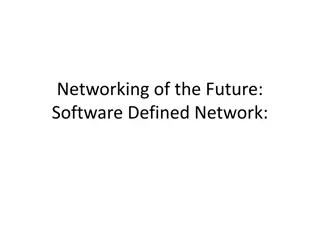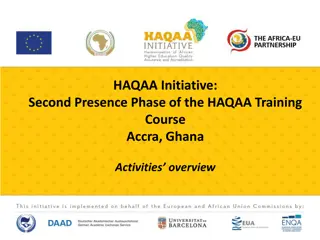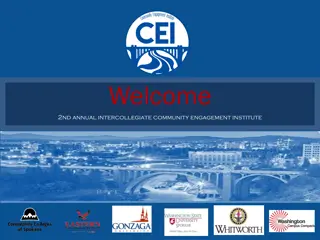Enhancing Engagement Through Social Networks in Higher Education
Exploring the use of social networks, specifically Instagram, to improve student engagement and implement a research-led curriculum in higher education. The discussion covers the shift to blended learning post-COVID-19, the relationship between student satisfaction and research intensity, and the benefits of utilizing social networks for academic purposes. Strategies such as introducing research-led teaching activities, increasing engagement, and linking academic content to students' real lives are highlighted.
Download Presentation

Please find below an Image/Link to download the presentation.
The content on the website is provided AS IS for your information and personal use only. It may not be sold, licensed, or shared on other websites without obtaining consent from the author. Download presentation by click this link. If you encounter any issues during the download, it is possible that the publisher has removed the file from their server.
E N D
Presentation Transcript
The use of social networks to improve engagement and implement a research-led curriculum Dr.Sofia Izquierdo Sanchez Department of Economics University of Manchester Dr.William J. Tayler Department of Economics Lancaster University DEE 4-5 September 2023, Heriot-Watt University
What will we talk about today? The use of social networks as a way of Introducing research-led teaching activities; Increasing engagement Relating teaching to students real lives. We introduced an Instagram page (@dailylifeecon) to complement the learning experience of students in various economics modules at the University of Manchester and Lancaster University. Using posts, reels (short videos up to 90 seconds), and stories (posts available for 24 hours), we engaged the students ahead of the lecture trying to attract their attention and motivate them to increase engagement. We linked the content to case studies and/or academic papers promoting an active research-led curriculum, and, complementary to academic teaching, we outreach economics to the general public.
A shift to blended learning The impact of the Covid-19 pandemic on traditional university learning 66% of students prefer blended learning Disengagement from students Integration of research in higher education has positive results in student motivation and final grades (Boyer, 1990; Kinkead; 2003; Land and Gordon, 2013). The optimal combination between teaching and research-led teaching (Griffiths, 2004; Haaker and Morgan-Brett, 2017; Healey and Jenkins, 2009; Pfeiffer and Rogalin, 2012; Zamorski, 2002).
Relationship between student satisfaction and research intensity (2008-2021) Business and Management Accounting and Finance 4.2 4.1 4 3.9 Economics Hospitality and Tourism Marketing 4.2 4.1 4 3.9 0 .5 1 0 .5 1 0 .5 1 Research Intensity 95% CI Fitted values Graphs by Subject
The use of social networks in higher education The benefits of the use of social networks in academia have been demonstrated for both, students and academic (Nandez and Borrego , 2013; Meishar-Tal and Pietersen, 2019). They have been used to increase engagement, self-learning, as large case discussions platforms, or to promote collaborative learning (Al-Balhrani and Patel, 2015 and 2017; Dabbagh and Kitsantas, 2012; Deng & Yuen, 2010; George, 2011; Guy, 2012; Junco et al., 2010; Jones and Baltzersen, 2017; Middleditch et al., 2022) We study the use of Instagram to relate academic content to students' real lives. Our approach aims to connect research-led teaching activities, engagement enhancement, and real-world relevance through reels, posts, and case study repositories. This aligns with Generation Z's affinity for Instagram as a valuable educational tool.
How much Generation Z uses Instagram 100 93 88 90 84 80 80 76 75 74 70 68 67 70 65 62 60 usage share 54 54 49 47 50 45 40 40 30 20 10 0 YouTube Instagram TikTok Snapchat Facebook Twitter Social Network All Males Females
Introducing the Instagram Approach @dailylifeecon For the Academic year 2022-2023 we introduced an Instagram page (@dailylifeecon) as a complementary tool for students learning in the modules: Principles of Microeocnomics 2 (1st year, University of Manchester); Managerial Economics I (2nd year University of Manchester); Microeconomics 4 ( 2nd (and some 3rd )year University of Manchester); Monetary Macroeconomics ( 3rd Year, Lancaster University). The three modules were taught in the economics programmes of their respective university, however students from different degrees could take some of these modules as optional.
Engagement 2500 7000 6000 2000 5000 number of people Number of people 1500 4000 3000 1000 2000 500 1000 0 0 12 13 14 15 16 17 18 19 20 21 22 23 24 25 26 27 28 29 30 31 32 33 34 week of the year 2 4 6 8 10 12 14 16 18 20 22 24 26 28 30 32 34 36 38 40 42 Sequence of content posted Followers Non-Followers Impressions
Case Study 1: Content linked to case studies Did you know that the Edgeworth Box is a powerful tool used to showcase how exchange between two individuals can boost one person's well-being without hurting the other? This leads to a win-win situation, enhancing overall social welfare from a given set of resources! It's all about that Pareto improvement making everyone better off without making anyone worse off! During our summer break at a campsite in Spain, we can illustrate the basics of the Edgeworth Box, shedding light on the fascinating world of general equilibrium theory! Let's dive into the world of economics while soaking up the sun and learning something new! Are you ready to unravel the mysteries of the Edgeworth Box with us? For economists or those curious minds who will like to know more, you can access a full case study in the case studies bank (link available in bio)
Case Study 2: Content linked to academic papers or articles A young renter living pay check to pay check, a father with a new mortgage, and an outright homeowner with investments enter into a bar do you want to know how the increase in interest rates are affecting them? A reel based on How the Bank of England s interest rate hikes are filtering through your finances by William Tayler (Lecturer at Lancaster University) at The Conversation On the 22nd of September, the Bank of England will decide whether to increase again the interest rates but that s a conversation (or a reel) for another day
Impact on students and performance We collected data on followers and their interactions per post and studied whether engagement with the Instagram account influenced the student s final mark. On average 12% of the students were following the account, however, the students could interact independently of being a follower. We find that being a follower doesn t translate into actively engaging with the content. 34% of the students engaged with the account on a regular basis. We use an OLS regression to analyse the effect that either being a follower or interacting with the account have on the student s final mark. We then study whether being a follower or actively engaged with the account has an effect on the probability of failing or getting a mark above 60.
(1) (2) (3) VARIABLES Final mark Probability fail Probability above 60 Follower 3.284*** -0.525 0.246 (1.197) (0.429) (0.156) Number of interactions 0.224*** -3.522*** 0.0372* (0.0668) (0.136) (0.0208) Constant 65.83*** 1.487*** -0.778*** Instagram engagement and final marks (0.628) (0.0923) (0.0662) Subject fixed effects YES YES YES University fixed effects YES YES YES (2.031) (0.274) (0.179) Constant 65.92*** (0.629) Robust s.e YES YES YES Observations 978 978 978 Note: Standard errors in parentheses *** p<0.01, ** p<0.05, * p<0.1. The dependent variable in Column 1 is the final mark of student i in subject j. The dependent variables in column 2 and 3 is a categorical variable which takes value 1 if the final mark of a student is less than 40 or higher than 60, respectively; and 0 otherwise.
Opinion Percentage of students 62% Understanding complex concepts 69% Making concepts relevant to real- life Students Feedback 69% Approachability or engagement 77% Creative or refreshing 54% I will share the content with friends 46% Good opportunity for feedback
Some insights Integration of social networks for research-led teaching. Instagram as a tool for engagement and real-life connections. Positive correlation between engagement and final marks. Feedback highlighting improved comprehension and engagement. The presented study addressed this challenge by creatively leveraging Instagram to bridge the gap between research and student engagement. Outreaching economics
